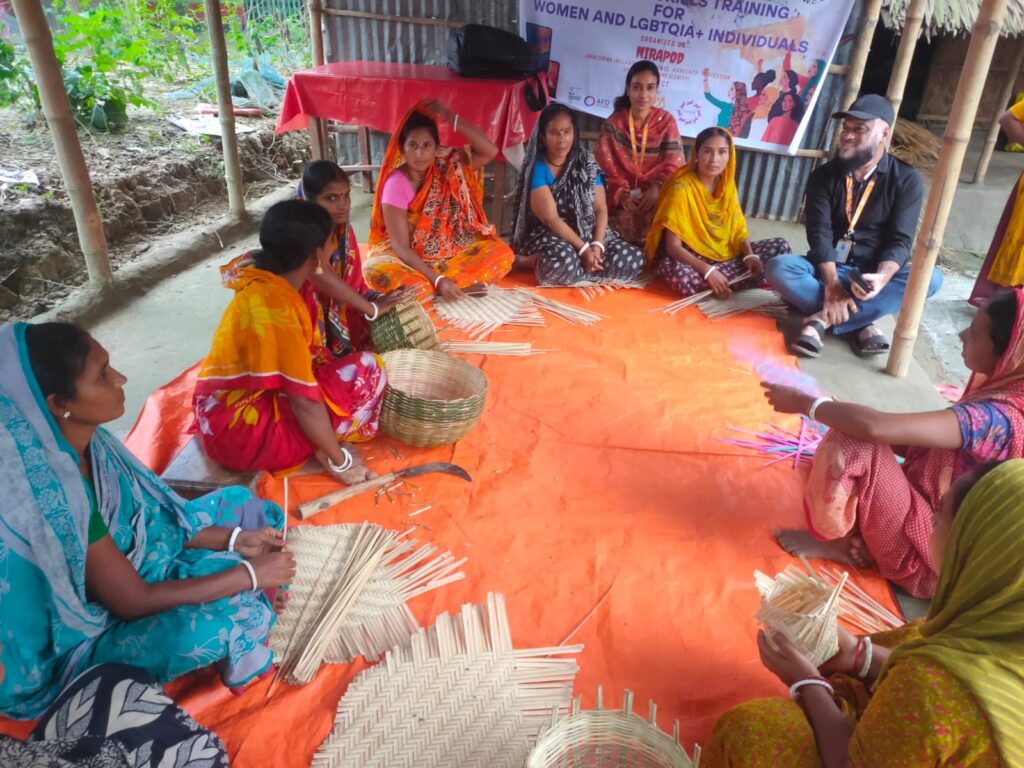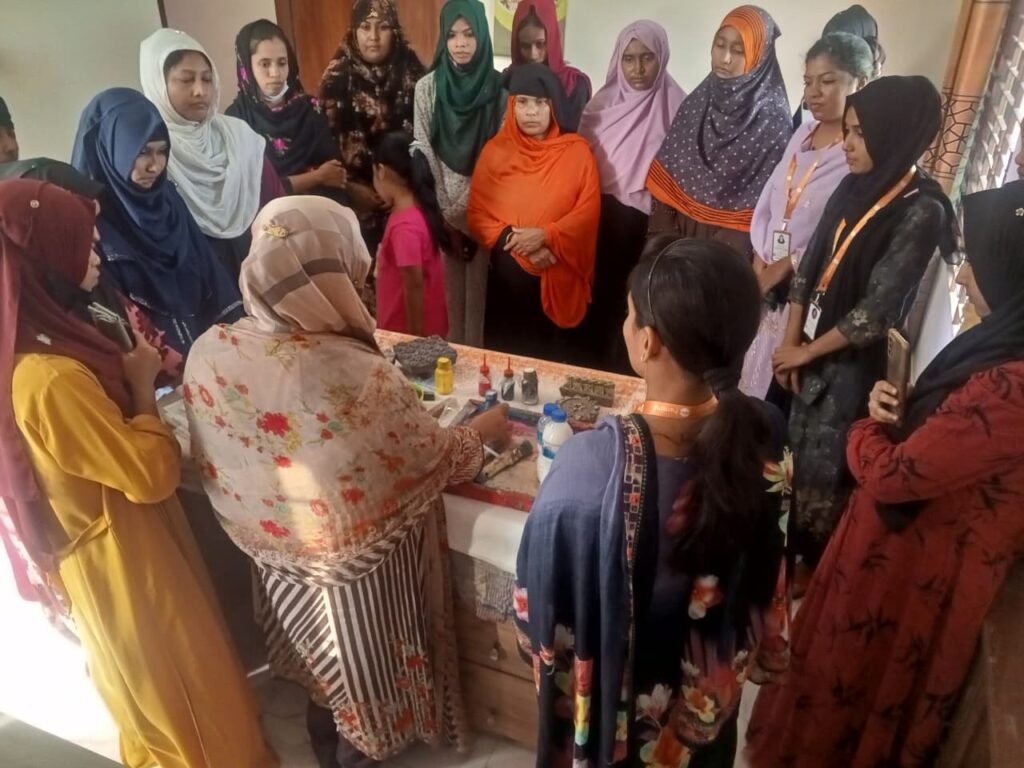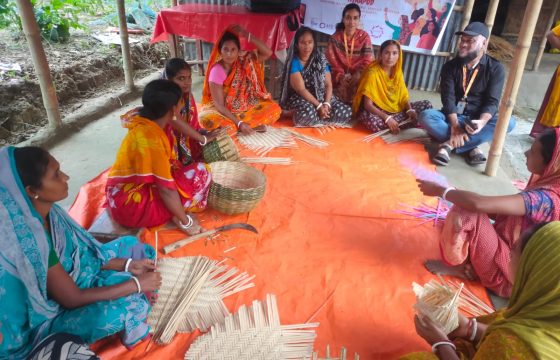In Bangladesh, women’s entrepreneurship is transforming local economies and reshaping communities, breaking long-standing barriers rooted in gender inequality. For over 15 years, Dhaka Women Chamber of Commerce and Industry (DWCCI) has been at the forefront of this transformation – supporting thousands of women entrepreneurs through training, policy advocacy, and access to finance across the country. Yet, challenges remain: as of 2024, only about 7% of business establishments in Bangladesh are women-owned, and fewer than 6% of women entrepreneurs have access to formal credit, highlighting persistent structural gaps.
Through the FAME Project with the support of AFD, implemented by a consortium led by Geres and composed of 6 partners including Dhaka Women Chamber of Commerce & Industry (DWCCI) in Bangladesh as a member of the South Asian Women Development Forum (SAWDF), this movement is gaining new momentum.
At the heart of the project are local Civil Society Organizations (CSOs) working directly with women at the grassroots. From market traders and artisans to young entrepreneurs and survivors of gender-based violence, these CSOs are helping women turn resilience into leadership. By providing training, mentorship, and financial inclusion opportunities, FAME ensures that women-led businesses thrive in safe, equitable, and supportive environments; where every woman has the right, resources, and recognition to lead.
Empowering Market Women through Leadership and Dignity — CWCS
In the busy lanes of Karwan Bazar, one of Dhaka’s largest traditional markets, women vendors are rewriting their stories of resilience and independence. Within the FAME Project, and through the Centre for Women and Children Studies (CWCS), women who once worked quietly on the margins of the market are now taking control of their businesses and making their voices heard.
Under the project “Breaking Barriers: Leadership Programs and Economic Empowerment of Women in Market Trading,” CWCS has trained 50 market women; many of them widows, single mothers, or survivors of violence in leadership, communication, business management, and gender rights. The program not only strengthens their practical business skills but also builds the confidence to claim their space in a male-dominated marketplace.
Participants like Ambia, a betel leaf seller, and Brishti, a fish-scale trader, now negotiate with customers, plan their earnings, and engage with market committees without fear or hesitation. and They also began sharing decision-making power at home. Their growth has inspired others around them, creating a ripple effect that extends to over 200+ indirect beneficiaries, including family members and fellow traders.
What sets this initiative apart is its focus on women in informal markets: a group often excluded from conventional entrepreneurship programs. By linking economic empowerment with leadership and social recognition, CWCS is not just helping women earn a living but enabling them to stand as visible, respected contributors to their communities. These women are proving that empowerment begins not in policy halls, but in the everyday courage of those who choose to lead.
Reviving Rural Livelihoods through Handcraft and Skills — ABALAMBAN
In the quiet villages of Gaibandha district, a remarkable shift is taking place. Under the FAME Project, ABALAMBAN is helping rural women artisans rediscover their skills and transform them into sustainable livelihoods, through its initiative “Empowering with Skills, Promoting Artisanal Diversity, Enhancing Livelihoods.”
Six producer groups, involving 120 women, have received hands-on training in jute weaving, crochet, macramé, and livestock rearing. These sessions have helped women refine their techniques while learning how to price their products, manage small enterprises, and connect to buyers. The progress is tangible: crochet groups have already started fulfilling local orders for handcrafted dolls and mats, while jute producers are selling woven runners and floor covers in neighborhood markets.
For many, this is the first time their craftsmanship has translated into income. Their earnings now contribute to household expenses and children’s schooling, bringing newfound respect within their families. The training has also fostered strong peer support: groups share materials, exchange ideas, and plan to set up small cooperatives for larger production.
What makes this project innovative is its integration of craft revival, entrepreneurship, and market linkage. By combining traditional skills with business development support, ABALAMBAN is creating pathways for women who are often excluded from formal employment. It recognizes that sustainable entrepreneurship in rural Bangladesh begins not in factories, but in the quiet rhythm of handmade work that carries both tradition and pride.
Building Resilience and Inclusion — PURNIMA
In Jashore district, PURNIMA is helping women and LGBTQIA+ individuals reclaim their dignity and livelihood through its NIRAPOD Project (Nurturing Inclusion, Resilience, Advocacy, Protection, Opportunity, and Dignity) under the FAME initiative. The project blends entrepreneurship with psychosocial and legal support – a holistic model that helps marginalized people rebuild their confidence and independence
Since the project’s inception, PURNIMA trained 150 participants in tailoring, handicrafts, food processing, and small business management. Many have already started small enterprises, generating steady income for their families. Beyond livelihood training, the organization established four safe spaces and legal support centers, serving 120 people, where survivors of violence and discrimination receive counseling, legal advice, and referrals.
The project’s innovation lies in its inclusive design — combining economic empowerment with protection and advocacy. By addressing both financial vulnerability and social stigma, NIRAPOD creates a pathway for women and gender-diverse individuals to participate equally in economic life. PURNIMA’s work shows that entrepreneurship can be a vehicle not just for income generation but for dignity, solidarity, and systemic change; empowering those who have long been excluded from both opportunity and recognition.


Conclusion
The FAME Project is creating pathways for women to lead, earn, and inspire within their communities. Through the guidance of Dhaka Women Chamber of Commerce & Industry and the commitment of its partner CSOs, more women are gaining the skills and confidence to shape their own futures. Each story reflects a shared purpose; to build a more inclusive and equitable society where women’s leadership and entrepreneurship are part of everyday life in Bangladesh.
Naaz Farhana, President of the Dhaka Women Chamber of Commerce & Industry (DWCCI), and SAWDF Bangladesh Vice-President





